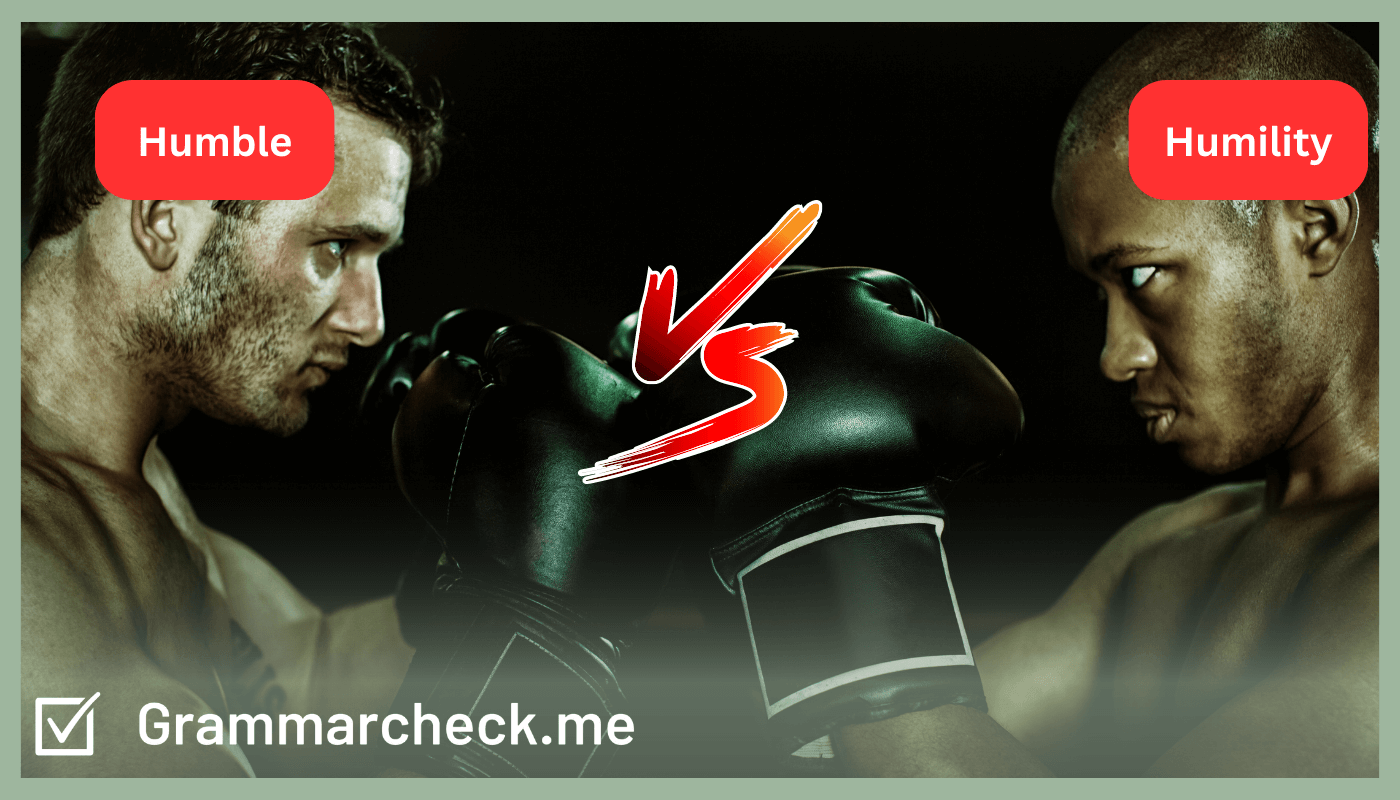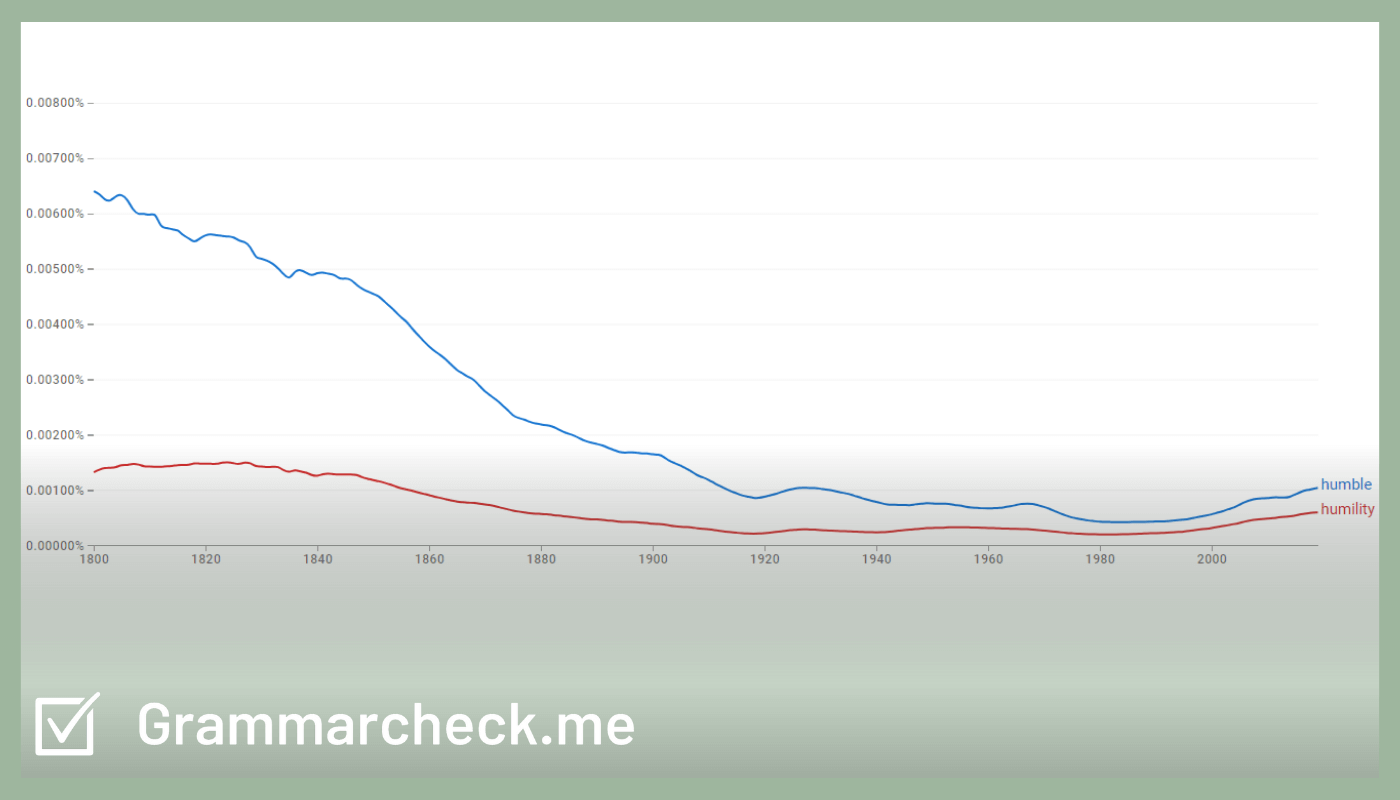Humility is a noun that refers to the state of being humble. A person with humility does not consider themselves better than others. The word humble is an adjective that is used to describe someone that shows a modest estimate of their own importance.
The main difference between humility and humble is their part of speech. These words have a nearly identical meaning but humility is a noun and humble is an adjective.
In this post, we’ll explain the words humble and humility in more detail. We’ll also explain how they can be used in your writing, popularity, and common synonyms.

What Is The Definition Of Humility?
The term “humility” is defined as the quality or state of being humble. It is a noun used to describe the modest and unassuming nature of an individual. Someone who has humility has a realistic understanding of their own limitations.
A person that contains humility has a willingness to listen, learn, and empathize. People who have humility make great leaders because they have a modest or low estimate of themselves. These type of people do not make decisions based off of ego or pride.
What Is The Definition Of Humble?
The term “humble” is defined as having a modest and unpretentious view of oneself or one’s accomplishments. Humble is an adjective that describes the personality of someone that has a lack of arrogance or excessive pride.
A person that is humble displays an attitude of self-awareness and is willing to recognize the abilities and achievements of others. People that have a humble attitude do not seek attention or praise for their actions. A humble person possesses a more down-to-earth nature in their personal relationships, professional settings, or moments of success.
What Is The Main Difference Between Humble vs Humility?
The main difference between “humble” and “humility” is their parts of speech. “Humble” is an adjective & “humility” is a noun.
- A person can be humble (adjective).
- A person can have humility (noun).
How Do You Use Humble In A Sentence?
Here is a list of 5 sentence examples that contain the word humble.
- Despite his remarkable achievements, he remained a humble individual, always treating others with kindness.
- The artist’s success did not make her arrogant; instead, she remained humble and appreciative of her audience’s support.
- His humble origins never hindered his ambition; he used them as a source of motivation to succeed.
- The leader’s humble approach to management fostered a collaborative and productive work environment.
- She gave a humble speech, attributing her accomplishments to the collective efforts of the team.
Just like we learned in our post about the phrase “resonated with me“, writers need to understand context to make the proper word selection.
How Do You Use Humility In A Sentence?
Here is a list of 5 sentence examples that contain the word humility.
- The king ruled with a rare sense of humility, often seeking advice from his advisors and considering the needs of his subjects.
- Her humility was evident in the way she interacted with everyone, treating the janitor and the CEO with the same level of respect.
- The athlete’s display of humility after winning the championship endeared her to fans and opponents alike.
- The monk’s life was a testament to the values of simplicity and humility, living in a modest monastery and dedicating himself to service.
- The speaker’s humility shone through as he shared his personal failures and struggles, inspiring the audience with his authenticity.
Just like we saw in our post comparing the words organization vs association, even small spelling changes can make a huge difference.
Popularity Analysis
Google’s N-gram data shows that “humble” is more popular than “humility”. But not by much! Since the 1990’s these words have started to be used more frequently in published writing. Both of these words have nearly identical use cases so it is not surprising that they have similar popularity. However, just like we saw when analyzing the phrase “fishing in the dark”, the popularity of words & sayings can change significantly over time.

What Are Different Forms Of Humble?
Below are the most popular alternate forms of the word humble. Each form is a different part of speech and should be used in different contexts.
- Humble (adjective)
- Humbly (adverb)
- Humbleness (noun)
What Are Synonyms For The Words Humility & Humble?
Here are 3 synonyms for the word humility.
- Meekness
- Humbleness
- Unpretentiousness
Here are 3 synonyms for the word humble.
- Unassuming
- Modest
- Meek
What Is The Opposite Of Humility & Humbleness?
The opposite of “humility” and “humbleness” is someone that has excessive pride, arrogance, or a lack of modesty. To be arrogant means to have an exaggerated sense of one’s own importance, abilities, or achievements, often accompanied by a lack of consideration or respect for the opinions and feelings of others.
Frequently Asked Questions
Attributes associated with humility include modesty, a willingness to learn from others, self-awareness, empathy, and the ability to acknowledge one’s mistakes.
Common spelling mistakes for “humility” might include misspellings like “humbility,” “humilty,” or “humilitiy.”
The Bottom Line
By now you should be an expert of the difference between humility and humble. These words are commonly confused because they have the same definition. However, the difference between humble & humility is their parts of speech. Humble is an adjective and humility is a noun. If you need more help with grammar rules like this use our tool for checking grammar to make things much easier.
